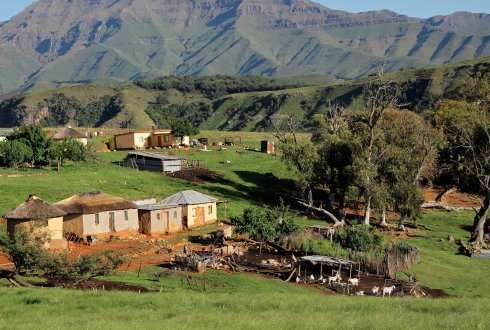Conventional methods of agriculture and cattle-breeding cannot feed the world population. They are not sustainable, pollute the environment, are responsible for reducing biodiversity and have a damaging effect on human health. In order to guarantee food security for nine million people in 2050, there is a pressing need to intensify agricultural production. However, this will have to be done in an ecologically responsible manner, making intensive and smart use of natural ecosystem functions. Professor Pablo Tittonell shall assert this view on 16 May upon accepting the post of Professor of Farming Systems Ecology at Wageningen University, part of Wageningen UR.
In his inaugural speech titled Farming Systems Ecology. Towards ecological intensification of world agriculture, Pablo Tittonell rejects the assertion that the world produces sufficient food to prevent hunger and that the main problem is distribution. The main problem is actually that food production does not take place in the areas of the world where it is most needed. Tittonell believes there is no point in increasing food production in the rich West as that is not a sustainable, efficient option.
Ecological intensification of agricultural production should take place in particular in the South, in developing countries, where small farmers are still responsible for half the world's food production. The highly developed North, in fact, needs to 'extensify' its agriculture and animal husbandry. This would involve less exploitation of limited resources such as fossil fuels, without affecting food security, he says.
Outdated
Professor Tittonell refers to the generally accepted calculation that between now and 2050 the world-wide demand for food will increase by 70%. He is firmly convinced that conventional agricultural production will be unable to meet the needs created by that increase, one reason being that the growth in use of nitrogen-containing fertilisers is gradually reaching its limits. However, Tittonell regards the exploitation of fossil energy as even more discouraging. His calculations demonstrate that feeding nine million people solely from conventional agricultural production will cause the world's oil reserves to be totally exhausted within about twelve years.
"Society is already subsidising the purchase of fertilisers, pesticides and fuel for the agricultural sector. That same society will subsequently suffer the damaging effects of doing so. On the other hand, because consumption patterns in the Western world rely largely on animal proteins and energy-rich food, many people are overweight. On a global scale, obesity outweighs hunger," Tittonell observes. It also leads to food wastage; 30 to 50% of the food we produce never reaches a human stomach, the professor says.
The number of criteria used to evaluate sustainability in conventional agriculture and animal husbandry has been reduced over the years to just one: CO2 emission. "That is worrying," Tittonell remarks, "as it explains why we can claim that factory-farmed broilers are more sustainable than free ranging ones. Yet CO2 emissions say absolutely nothing about animal welfare, the dependence on antibiotics, the circumstances in which poultry farmers have to work, their debts, or the quality of the chicken meat. Moreover, the poultry industry is responsible for only 1% of the total Dutch CO2 emissions, so if you seriously want to tackle CO2 levels, the poultry sector is not the place to start". Prof. Tittonell regards the prevailing conventional agricultural production model as outdated. He believes we need to look for alternatives.
Ecological intensification
Although it might seem like a good idea to feed the growing urban populations by applying the traditional manner of production used by small farmers in developing countries – after all, their methods do not have the drawbacks of conventional production – this will not be enough, says Pablo Tittonell. There is an urgent need for intensification, but how do we go about that? There is sufficient scope for raising world food production in a sustainable manner by applying what he calls ecological intensification. This means that agriculture and animal husbandry have to make intensive and smart use of the natural functions that the ecosystem, the landscape, has to offer. The standard approach based on increasing the production of an individual animal or a field is outdated. "We have to think outside the box", Tittonell says, and adopt systems approaches that consider all factors that make up for costs, negative externalities and diverse forms of livelihoods.
Invest in research
Studies carried out in 2012 showed that the average yield from conventional agriculture was 20% higher than that from the organic sector. Tittonell was even more surprised by the gap between conventional and organic agriculture in terms of investment in research and the development of technology and know-how. There the gap was as much as 90 to 95%. Of the research funding the Dutch government made available to the agricultural sector over the last ten years, some 10% went to organic farming and husbandry. However, that policy is no longer being pursued because attention has turned to top sectors.
All things considered, Tittonell is amazed that the yield gap between conventional and organic agriculture is 'only 20%'. The farmers themselves are responsible for most of the innovations in know-how and technology in organic agriculture. Prof. Tittonell therefore argues for more public awareness and for more public investment in organic or ecologically intensive agriculture. He would expect any investments in research to produce results rapidly; certainly with Wageningen having built up such a considerable amount of expertise over the years in the field of production and system ecology, and being so successful in deploying a multidisciplinary approach.
Provided by Wageningen University





















